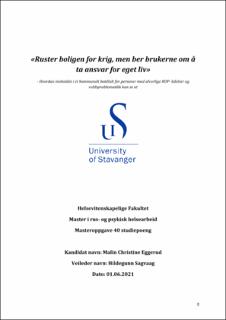Ruster boligen for krig, men ber brukerne ta ansvar for eget liv. - Hvordan innholdet i et kommunalt botiltak for personer med alvorlig ROP- lidelser og voldsproblematikk kan se ut
Master thesis
Permanent lenke
https://hdl.handle.net/11250/2976386Utgivelsesdato
2021Metadata
Vis full innførselSamlinger
- Studentoppgaver (HV) [1301]
Sammendrag
Hensikten i denne masteroppgaven har vært å undersøke hvordan et kommunalt tjenestetilbud i et botiltak tilknyttet ROP- prosjektet i Stavanger kommune kan se ut. Studien siktet seg inn på hvilke metoder og virkemidler som er viktige for at tjenestene skal favne et helhetlig perspektiv på helse. Gjennom to fokusgrupper undersøkte studien ansattes erfaringer og refleksjoner rundt hva et verdig tjenestetilbud kan innebære for personer med alvorlige rus- og psykiske lidelser og voldsproblematikk. Datamaterialet ble senere transkribert og analysert ved hjelp av Tjoras (2012) SDI- metode og det ble generert datasett i softwareprogrammet Nvivo. De viktigste funnene i studien handler om ansattes miljøterapeutiske tilnærminger og meningsfull aktivitet, hvordan det å øke kunnskapen om voldsrisikovurderinger i kommunen kan bidra til et tettere samarbeid rundt brukeren, hvordan det å bruke funksjon over diagnose i vurderingen av samtykkespørsmål og samarbeidet med spesialisthelsetjenesten. Funnene ble knyttet opp mot et recoveryperspektiv og tidligere forskning i diskusjonsdelen. Studien konkluderer med at et helhetlig tilbud favner noe mer enn bare bolig og ulike tjenester, et verdig tilbud må inneholde respekt for enkeltindividets følelser og oppfatninger om egen situasjon. Samtykkekompetanse ser ut til å være en hindring for å oppnå gode tjenester til rett tid og deltakerne i denne studien trekker frem økt kompetanse om voldsrisiko og kontaktpersoner knyttet til botiltaket som løsninger som kan bidra til å lettere samarbeidet. The aim of this masterthesis was to investigate how a municipal service offer may look like for people who suffer from mental health disorder and substance abuse disorder and are at risk of using violence. This project was related to a larger study, the ROP- project in Stavanger municipality. The aim of the investigation was to identify methods and types of instruments that could function as a baseline for a holistic perspective on healthcare services. Data was collected through two separate focusgroups and the aim of the discussions was to examine employees' experiences and reflections from past work experience and offer thoughts on what they would consider to be a holistic healthcare service. The datamaterial was then transcribed and analysed using Tjoras (2012) SDI- methods. To ensure struture and systematic approach, the softwareprogram Nvivo was used for coding purposes. The most important findings where the staffs theraputical approach to users in relations to meaningful activities, how knowledge about risk of violence among municipal staff might make cooperation between intances easier. More findings suggests that using a persons daily functioning over diagnosis in questions regarding competence of consent, might be a step in the right direction in regards to collaborate on services and managing admissions. The results where then discussed in relevance to recovery and previous research in the field. This study shows that a holistic perspective on health is not all about the spesific healtcare services. A holistic approach to a good healthcare service, requires staff and users to be more equal participants in the recovery. Respect, good values and attitude in staff is what makes a healthcare service perceived as holistic and dignified. Furthermore, competence of consent seems to be perceived as hindering a good healthcare service at the right time. The findings sugggest that having knowlegde about risk of violence, permanent contacts at the hospital who has in-depth knowledge about the kind of municipal services the staff do, can strengthen the cooperation.
